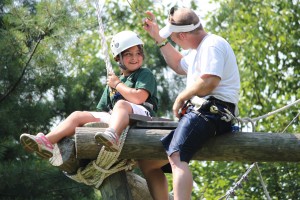
When you’re sending your child to sleepaway camp for the first time, even if you’re a seasoned camper yourself, the process of choosing a camp can be a little bit overwhelming – and you might not remember to ask all the right questions. Any good camp director will tell you about their camp philosophy, programs and traditions, but there are some questions you can ask to ensure you and your daughter are making the right choice for her. Here’s a handy clip-and-carry guide to bring along to those camp tours so you can be sure to get the information you need about the prospective summer homes you’re considering for your daughter.
What steps do you take to help welcome my daughter to camp?
Camp life is wonderful, and it’s also a big adjustment — new friends, new bed, new food, new schedule. It’s a lot to take in! How does this camp help your daughter make the transition? Are there pre-camp programs, like pen pals or meetups, to help her make connections before she gets off the bus? Will she have a “buddy” or “big sister” at camp to answer her questions and serve as a role model?
Who will supervise my daughter at night?
Some camps have a counselor on duty in each and every cabin every night, while other camps have one “OD” (on duty) counselor supervising several cabins while other staff members have time off. Make sure your daughter’s camp has an OD policy that provides for a level of coverage that you’re comfortable with.
When will I talk to my daughter?
Part of the camp experience is becoming more independent, and that usually means daughters don’t get to talk to their parents every single day. Find out what your camp’s communication policy is, and make sure if you have any questions about it you ask them before camp starts. Will your daughter call home during the summer? Can you send her e-mails? Will she be required to write letters? And are you willing to abide by the camp’s communication policy?
What do you do to look out for campers’ emotional wellbeing?
Activities and skill building are important parts of any camp program, but your daughter isn’t just an athlete, artist and adventurer — she’s also a sensitive, growing girl. What does this camp do to make sure your daughter’s emotional needs are being met and to prevent and address bullying and other destructive behaviors? What is the camp’s discipline philosophy?
How can you accommodate my daughter’s special needs?
Whether it’s a special diet, a special friend or a special interest, if there is some additional attention your daughter will need during the summer, make sure to ask the camp director about it before you commit to the session. If a camp is not able to work with you to accommodate your daughter’s kosher diet or need for extra tennis lessons, that’s something you need to know before you put down your deposit.
What makes your camp special?
There are lots of good camps out there, but not every camp is the right fit for every camper. Make sure you pick a camp for your daughter that reflects her values, needs and interests. That’s the best way to ensure you’re sending her to a camp that will be more than an experience — it will feel like a second home.







 The below blog entry was written for us by Bob Ditter, a child, adolescent, and family therapist in Boston. Bob has been working with the Bryn Mawr staff for the past eight years. In addition to training our staff, Bob spends four days at camp during the summer “in the trenches” helping campers and staff.
The below blog entry was written for us by Bob Ditter, a child, adolescent, and family therapist in Boston. Bob has been working with the Bryn Mawr staff for the past eight years. In addition to training our staff, Bob spends four days at camp during the summer “in the trenches” helping campers and staff.

